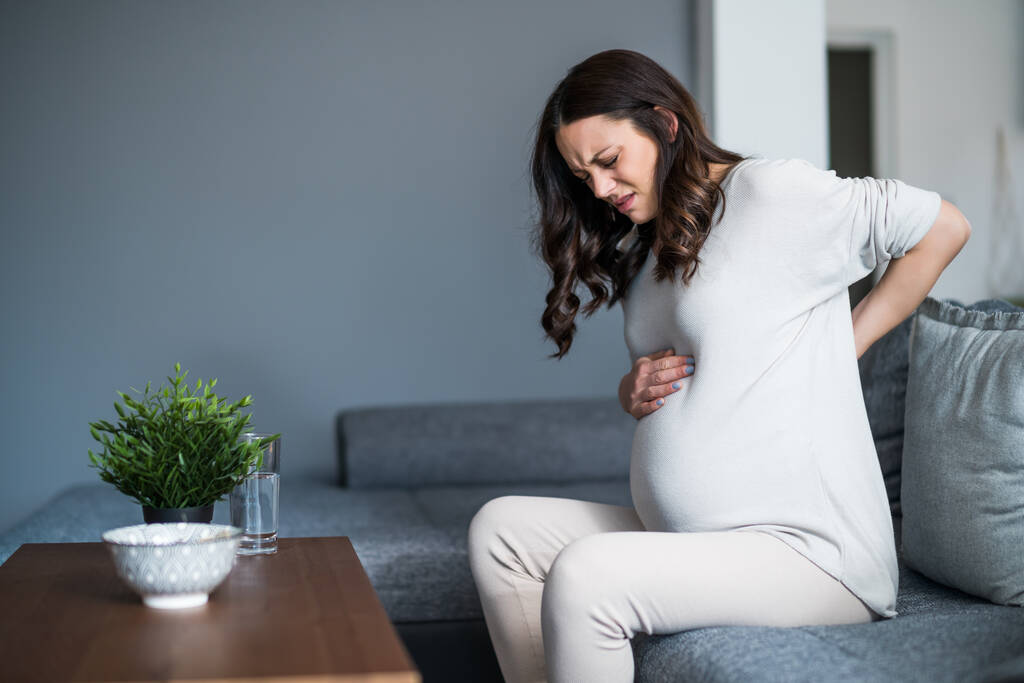Discover whether back pain is more prevalent during specific trimesters of pregnancy.
Is Back Pain More Common During Specific Trimesters?
Pregnancy is undoubtedly a magical time, where you get to experience the growth of a tiny human inside you. But let’s be real, it also comes with its fair share of aches and pains. And one of the most common complaints? Back pain. But here’s the million-dollar question: Is back pain more common during specific trimesters? Let’s dive deep into the mysterious world of pregnancy and back pain to find out.

Understanding Pregnancy and Back Pain
Before we uncover the truth, let’s take a quick crash course on the anatomy of pregnancy-induced back pain. You see, as your belly grows and your baby starts doing somersaults, your body goes through some pretty intense changes. These changes can put a strain on your back, leaving you feeling like a contestant on a “World’s Strongest Mama” reality show.
One of the main culprits behind your newfound back pain is those pesky hormones. Yes, those little chemical messengers that were once responsible for your mood swings are now playing a game of tug-of-war with your ligaments and joints. The result? A not-so-fun symphony of aching muscles and a spine that feels like it’s doing the Macarena.
But let’s dive deeper into the fascinating world of pregnancy-induced back pain. Understanding the anatomy of this discomfort can help you navigate through this journey with more knowledge and empowerment.
The Anatomy of Pregnancy-Induced Back Pain
So, what exactly happens inside your body to cause this back pain extravaganza? Well, picture this: as your baby grows, your uterus starts expanding like a balloon at a birthday party. This expansion causes a shift in your center of gravity, putting extra pressure on your lower back. It’s like your body is trying to play a not-so-funny prank on you.
But wait, there’s more! Your lovely hormonal friends, estrogen and relaxin, kick in to soften and loosen your ligaments, allowing your body to prepare for childbirth. While this may sound all rainbows and unicorns, it also means that your back muscles have to work extra hard to keep everything in place. It’s like they’re doing an intense workout without signing up for a gym membership.
Now, let’s take a closer look at the role of these hormones in the grand scheme of pregnancy-induced back pain.
Hormonal Changes and Back Pain
Let’s talk a bit more about these hormonal changes, shall we? Estrogen, the queen of hormones during pregnancy, increases blood flow to your kidneys and pelvis. While this may sound fancy, it can also lead to some serious water retention and bloating. And guess what that means? More pressure on your lower back and a higher chance of experiencing discomfort.
Relaxin, on the other hand, plays a mysterious role in the grand scheme of things. As its name suggests, it relaxes your muscles and ligaments, preparing your body for labor. But sometimes, it goes a bit too far and leaves you with a backache that could rival an ogre’s roar.
Now that we’ve explored the hormonal changes and their impact on your back, let’s delve into some additional factors that can contribute to pregnancy-induced back pain.
Additional Factors Contributing to Pregnancy-Induced Back Pain
While hormones and the physical changes in your body play a significant role in back pain during pregnancy, there are other factors that can contribute to this discomfort. One such factor is weight gain. As your baby grows, so does the load you carry. This added weight can put strain on your back muscles and lead to pain and discomfort.
Another factor to consider is your posture. As your belly expands, it’s natural to adjust your posture to accommodate the changes. However, poor posture, such as slouching or arching your back, can exacerbate back pain. Maintaining good posture and practicing proper body mechanics can help alleviate some of the discomfort.
Additionally, your level of physical activity and exercise during pregnancy can impact your back pain. While it’s important to stay active and maintain a healthy lifestyle, certain exercises or activities that put excessive strain on your back should be avoided. Consulting with your healthcare provider and engaging in pregnancy-safe exercises can help manage and prevent back pain.
Lastly, stress and emotional well-being can also influence your experience of back pain during pregnancy. Stress can cause muscle tension and exacerbate existing discomfort. Finding ways to relax and manage stress, such as through prenatal yoga or meditation, can provide relief for both your body and mind.
As you can see, pregnancy-induced back pain is a complex phenomenon influenced by various factors. Understanding the anatomy of this discomfort, the role of hormones, and additional contributing factors can help you navigate through this journey with more awareness and proactive strategies to manage and alleviate back pain.
Back Pain in the First Trimester
Ah, the first trimester, the magical time when you secretly wear stretchy pants and blame any sudden trips to the bathroom on a questionable burrito. But along with all the excitement and morning sickness, you might also experience some back pain. Don’t worry, you’re not alone in this journey. Many mamas-to-be face this challenge head-on.
Causes of First Trimester Back Pain
During the first trimester, your body is undergoing some major transformations, and your back is no exception. As your uterus begins to expand, it starts pushing against your spine, disrupting its once peaceful existence. Pair this with the surging hormones and their questionable choice in back support, and you’ve got yourself a recipe for discomfort.
Additionally, your ligaments and joints are getting ready for the marathon that is childbirth. This means that your body is going through some serious restructuring. While it’s amazing to witness firsthand, it also means that your back might feel like it’s attending a never-ending rave party.
Managing Back Pain in Early Pregnancy
So, what can you do to give your poor back a break during the first trimester? Here are a few tips to help you find some sweet relief:
- Exercise: Engage in gentle exercises like prenatal yoga or swimming to strengthen your back muscles and improve flexibility.
- Posture is key: Maintain good posture while sitting, standing, and lying down. Remember, you’re growing a tiny human, so slouching is not an option.
- Hot or cold packs: Apply a warm or cold compress to your back to alleviate pain and reduce inflammation. Just make sure to check with your healthcare provider first.
- Pregnancy pillows: Invest in a cozy pregnancy pillow that supports your growing belly and helps maintain a comfortable sleep position.
- Massage: Treat yourself to a prenatal massage, because let’s face it, you deserve it.
Back Pain in the Second Trimester
Welcome to the marvelous land of the second trimester! By now, you’ve probably outgrown your favorite pair of jeans and embraced the stretchy wonders of maternity wear. But along with that cute baby bump comes the potential for some mid-pregnancy back pain.
The Growing Baby and Its Impact on the Spine
As your little one continues to grow and develop, they become quite the attention-seeker. One way they demand attention is by causing your belly to expand, which puts additional strain on your spine. It’s like your baby is saying, “Hey, look at me! I’m here to make your back work extra hard!” Cute, right?
And let’s not forget about that magical hormone relaxin. It’s still doing its thing, loosening up your ligaments and joints. While this is necessary for childbirth, it can also lead to instability and discomfort in your back.
Prevention and Treatment Options for Mid-Pregnancy Back Pain
Don’t fret, mama! Here are some preventive measures and treatment options to help you survive the second trimester without feeling like you’re auditioning for “America’s Next Top Backache Model”:
- Gentle exercises: Continue with exercises that focus on core strength and flexibility, like prenatal Pilates or gentle stretches.
- Avoid heavy lifting: Whether it’s a grocery bag or your partner’s attempt to carry you like a princess, try to avoid heavy lifting, as it puts unnecessary strain on your back.
- Rest and elevate: Take short breaks throughout the day to rest and elevate your legs, relieving pressure on your back.
- Stay hydrated: Drinking plenty of water helps keep your muscles and joints hydrated, reducing the chances of muscle tension and discomfort.
- Supportive footwear: Invest in comfortable shoes that provide arch support, as they can alleviate pressure on your spine.
Back Pain in the Third Trimester
Ah, the final stretch! You’re so close to meeting your little one, and the anticipation is reaching an all-time high. But as you enter the third trimester, you might find that your back pain takes center stage once again.
The Final Stretch: Why Does It Hurt?
As your due date approaches, your baby starts practicing their front row seat kicks and rolls. While it’s exciting to feel them move, all that tiny ninja action can put a strain on your back. Your growing baby is taking up more space and putting pressure on your spine, like a tiny superhero cape that’s a size too small.
But fear not, because your superhero hormones, estrogen and relaxin, are here to save the day. By now, you’re well-acquainted with their mischievous ways, but this time, they’re also preparing your pelvis for delivery. This can lead to increased discomfort in your back and pelvic area.
Safe Pain Relief Methods for Late Pregnancy
With your due date around the corner, you’ll want to focus on finding safe pain relief methods that won’t cause any harm to you or your baby. Here are a few things to consider:
- Heat therapy: Apply a warm compress or take a warm bath to soothe your aching back muscles.
- Acupuncture or chiropractic care: Consult with a trained professional to explore alternative therapies that may provide relief.
- Pregnancy support belts: These magical creations can help distribute the weight of your belly more evenly, relieving pressure on your back.
- Sleep positions: Opt for a side-lying position with a pillow between your knees to support your spine and reduce discomfort.
- Communication is key: Talk to your healthcare provider about any persistent or severe back pain to rule out any underlying conditions or complications.
When to Seek Medical Attention for Pregnancy Back Pain
While back pain is a common companion during pregnancy, there are some instances where it’s crucial to seek medical attention. Remember, your healthcare provider is there to support you throughout your pregnancy journey. Reach out if you experience any of the following:

Recognizing Serious Back Pain Symptoms
- Severe or persistent back pain that doesn’t improve with rest or home remedies
- Back pain accompanied by fever, chills, or flu-like symptoms
- Numbness, tingling, or weakness in your legs
- Loss of bladder or bowel control
- Contractions or abdominal pain that worsens with back pain
The Role of Prenatal Care in Back Pain Management
Regular prenatal care plays a crucial role in managing back pain during pregnancy. Your healthcare provider can guide you through exercises, offer recommendations for safe pain relief methods, and address any concerns you may have. Remember, each pregnancy journey is unique, so their guidance and support are essential in navigating the ups and downs of pregnancy-induced back pain.
In conclusion, while back pain can make its presence known at any trimester, it doesn’t have to overshadow the joy and excitement of pregnancy. Understanding the causes and implementing preventive measures and treatment options can help you embrace this magical journey with a smile on your face and a happy back. So, let’s bid adieu to back pain woes and say hello to an unforgettable adventure filled with belly kicks, glowing skin, and a love like no other.



